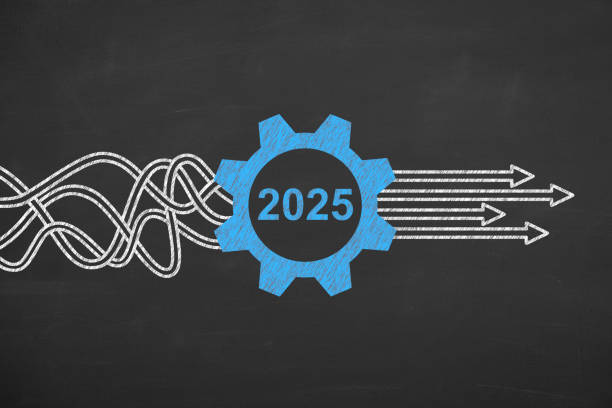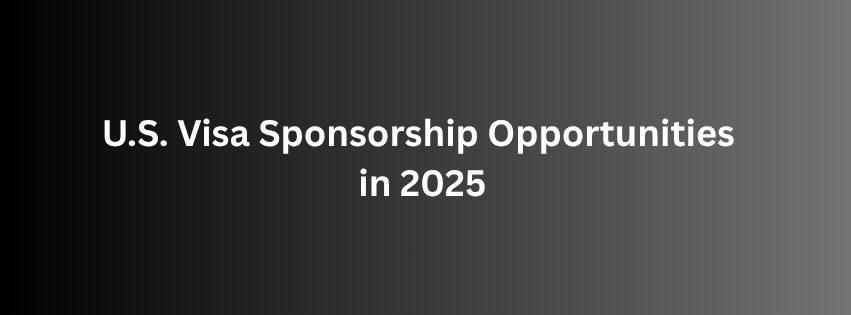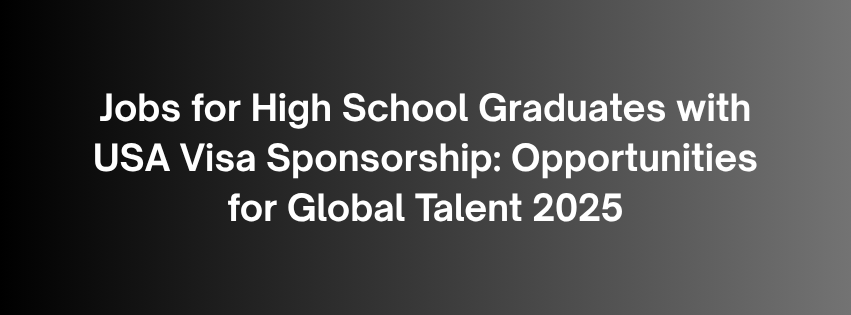In today’s dynamic global workforce, securing a position within the U.S. government remains one of the most stable and respected career choices. As we progress through 2024, the federal job landscape is not only expanding in scope and innovation but also increasingly welcoming skilled international professionals through various visa sponsorship programs.
This guide explores the wide array of U.S. government jobs that offer visa sponsorship, diving into key sectors, sponsoring agencies, application processes, benefits, and real-life success stories that inspire.
Understanding the U.S. Government Job Market
The U.S. government employs over 2 million civilian workers across a broad range of federal, state, and local departments. Federal agencies like NASA, the Department of Health and Human Services (HHS), and the Department of State are always on the lookout for global talent, particularly in fields requiring advanced technical skills or specialized knowledge.
Major Government Sectors Recruiting in 2024:
-
Technology & Cybersecurity – Agencies like the Department of Defense (DoD) and NSA are boosting cybersecurity initiatives.
-
Public Policy & Administration – Positions in federal executive departments and policy implementation roles.
-
Health & Biomedical Research – Opportunities abound within the CDC, HHS, NIH, and the VA healthcare system.
-
Education & Training – Roles in the Department of Education and federal grant programs.
-
Infrastructure & Engineering – Jobs related to national infrastructure in agencies like the DOT and U.S. Army Corps of Engineers.
-
Law Enforcement & Intelligence – The FBI, DEA, and DHS offer unique roles for qualified professionals.
What is Visa Sponsorship, and Why Does It Matter?
Visa sponsorship is the process by which an employer—here, a U.S. government agency—supports a foreign national’s application for legal work status in the United States. Given the complexity of U.S. immigration laws, sponsorship plays a pivotal role in enabling non-U.S. citizens to legally work and reside in the country.
Common U.S. Visas Used for Government Employment:
-
H-1B Visa – For professionals in “specialty occupations,” such as engineers, IT experts, and researchers.
-
O-1 Visa – For individuals with extraordinary achievements in fields like science, arts, education, or athletics.
-
J-1 Visa – Often used for researchers, medical trainees, or public health scholars on exchange programs.
-
TN Visa – Available under USMCA (formerly NAFTA) for Canadian and Mexican professionals in specific roles.
Top U.S. Government Agencies Offering Visa Sponsorship in 2024
1. Department of Defense (DoD)
As the largest federal agency, the DoD routinely recruits international talent in engineering, medicine, and cybersecurity through H-1B and O-1 visas. Visa holders often contribute to mission-critical innovations in defense technologies and national security systems.
Example Roles:
-
Cybersecurity Analyst (DoD Cyber Command)
-
Systems Engineer for Aerospace Defense
-
Military Health System Physician
2. National Aeronautics and Space Administration (NASA)
NASA fosters a highly inclusive, multinational scientific community. Through strategic visa sponsorship, the agency recruits foreign aerospace experts, mathematicians, and planetary scientists.
Example Roles:
-
Mission Systems Engineer
-
IT Data Architect
-
Astrobiology Research Scientist
3. Department of Health and Human Services (HHS)
This umbrella agency includes the CDC, NIH, and FDA, all of which actively hire international experts under J-1 and H-1B visa programs. Their roles often involve epidemic modeling, vaccine development, and medical innovation.
Example Roles:
-
Public Health Policy Analyst
-
Clinical Trials Specialist
-
Biostatistician
4. U.S. Department of State
The department recruits foreign language experts, cultural liaisons, and policy analysts to support global diplomatic missions. Visa sponsorship is frequently offered for individuals with unique linguistic or regional expertise.
Example Roles:
-
Foreign Service Officer
-
Cultural Affairs Specialist
-
Multilingual Interpreter
How to Apply for U.S. Government Jobs with Visa Sponsorship
Step-by-Step Application Process:
-
Research Job Listings
-
Use portals like USAJobs.gov, which features thousands of open federal positions across departments.
-
Filter by “accepts non-citizens” or “visa sponsorship available” if visible.
-
-
Identify Agencies That Sponsor
-
Agencies that have historically supported visa candidates include NASA, NIH, CDC, VA, and Department of State.
-
-
Tailor Your Application
-
Prepare a U.S.-style federal resume (not a CV), and a cover letter that highlights your unique qualifications and visa eligibility.
-
-
Secure a Job Offer
-
Most visa sponsorships require an offer of employment before the process begins. Interview rounds typically include panel assessments, security checks, and scenario-based evaluations.
-
-
Initiate the Visa Process
-
Once hired, your sponsoring agency will begin the visa paperwork. You’ll be guided on DS-160 or I-129 filings, depending on the visa category.
-
-
Security Clearance (if applicable)
-
For roles with access to classified or sensitive data, security clearance is mandatory. This includes fingerprinting, polygraph tests, financial history, and foreign contacts evaluation.
-
Eligibility Requirements
While each job has specific qualifications, the general requirements for visa-sponsored government roles include:
-
Advanced Education – A relevant degree (Bachelor’s, Master’s, or PhD) from an accredited institution.
-
Specialized Skills – Technical or analytical expertise that meets a “critical need.”
-
Work Authorization Pathway – Willingness to apply for a work visa via your employer’s sponsorship.
-
Language Proficiency – English fluency; in some diplomatic roles, additional language skills are essential.
-
Security Clearance – Background investigations for sensitive roles.
Benefits of Working for the U.S. Government as an International Employee
1. Long-Term Career Stability
Federal jobs are less prone to layoffs and offer consistent growth across decades. Once a visa-holder attains a green card or permanent residency, pathways to career advancement open up.
2. Comprehensive Compensation
-
Base Salaries: Competitive, often indexed to the General Schedule (GS) pay scale.
-
Healthcare: Full medical, dental, and vision insurance.
-
Pension Plans: Through the Federal Employees Retirement System (FERS).
-
TSP (Thrift Savings Plan): Government-matched retirement contributions.
3. Work-Life Balance
-
Generous leave policies
-
Hybrid work or telework options
-
Family-friendly workplace accommodations
4. Prestige and Purpose
Being a part of national initiatives—from public health to space exploration—adds a sense of pride and global purpose to one’s career.
Challenges and Considerations
1. Bureaucracy and Slow Timelines
Government hiring can be notoriously slow. From application to onboarding, it may take 3 to 6 months.
2. Security Clearance Hurdles
Non-citizens may face added scrutiny in background checks, particularly for roles tied to national defense or intelligence.
3. Limited Sponsorship Roles
Not all agencies offer visa sponsorship. Many positions explicitly require U.S. citizenship, especially in national security or law enforcement.
4. Cultural Adjustment
Transitioning into U.S. federal workplace culture may require adapting to hierarchical structures, documentation-heavy communication, and standardized protocols.
Inspiring Success Stories
Engineering at NASA: Dr. Priya Sharma
Originally from India, Priya joined NASA under an H-1B visa after being recognized for her research in satellite propulsion. Now leading projects at the Jet Propulsion Laboratory, she credits her success to NASA’s inclusive mentorship programs.
Public Health at the CDC: Dr. Carlos Martinez
Dr. Martinez, a Mexican-born epidemiologist, arrived on a J-1 visa to support CDC efforts during the COVID-19 pandemic. His research directly influenced community-level response policies nationwide.
Diplomacy at the State Department: Lena Novak
Lena, a Russian-born linguist, was recruited under an O-1 visa for her proficiency in multiple critical languages. Today, she facilitates high-level diplomatic communications in multilateral negotiations.
Final Thoughts: Is It Worth It?
Absolutely—if you have a specialized skill set, a passion for public service, and are ready to navigate the application maze. U.S. government jobs offer more than just financial stability—they provide the platform to make real, global impact.
Conclusion
The door to U.S. government jobs with visa sponsorship in 2024 is open wider than ever for skilled foreign professionals. From space innovation at NASA to disease prevention at the CDC, these roles not only offer visa sponsorship but also rich, purpose-driven careers.
While challenges like stringent clearance procedures and limited visa slots exist, the long-term rewards—job security, world-class benefits, and contribution to national progress—far outweigh the hurdles.
For international professionals with the talent and tenacity to thrive in the U.S. public sector, now is the time to explore and apply.
Start your journey today at USAJOBS.gov.



